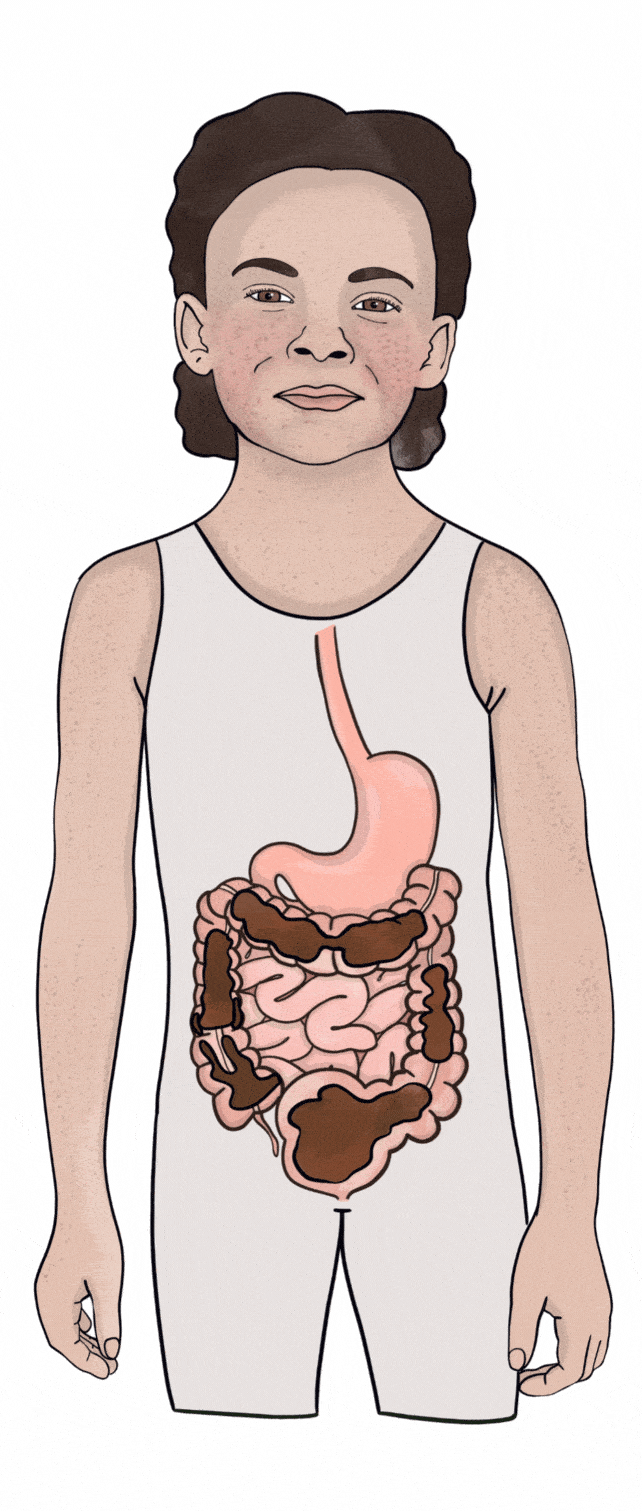

Soiling happens without your child knowing - it is not deliberate.
Soiling (encopresis) is when your child does poo in their pants after the age when you would expect them to be toilet trained. Soiling is a common problem affecting many children. It can happen in any child, toddler or teenager.
Poo usually comes down and passes out in 'single file'.
If for some reason your child does a hard poo and it hurts, they may try to avoid pain again by 'holding on' to the next poo.
If your child 'holds on' to their poo, the poo gets bigger and harder and stretches the bowel wall and the nerves around the bowel.
More poo gets stuck in the bowel which becomes more stretched. Overloading becomes worse - a vicious cycle begins.
The sensation or 'the urge' to have a poo is lost because the nerves have been stretched.
Overloading can be present even without the constipation being obvious. Your child can do poo daily but the backlog continues
When the bowel gets overloaded, poo trickles down or overflows without the child noticing. This often happens when they are relaxing, exercising, or after eating.
This is terrible for your child who has no idea what is happening to them.
Your child won't be able to understand why this is happening and so won't be able to explain it.

If your child is soiling, you should take them to your family doctor. Public health nurses can also be very helpful for your child with soiling. You could ask your family doctor about your local public health nurses.
Your doctor may suggest your child sees a specialist nurse or doctor if:
Treatment for soiling focuses on:
Read about constipation treatment [1]
Treatment should continue for enough time to allow the bowel size and feeling (sensation) to return to normal. This is usually for months, or sometimes years.
Soiling problems can be frustrating and upsetting for parents and children. It's important to understand the cause and not to blame your child for soiling. It can be hard to understand that stretched nerves really do mean your child isn't aware when they've soiled. Soiling is upsetting and can cause other behaviour problems which usually improve when the soiling is treated.
Remember the poo is the problem, not your child. Don't blame them.
You could watch a video with your child. 'Poo hoo' is a story about Tim Thompson who is having problems with sore tummies and sneaky poos (Continence NZ video).
Educate and encourage your whole family to be supportive and understanding.
Stay calm and be supportive of your child. Remember the poo is the problem, not your child. Getting angry will make you feel bad and make your child tense and treatment is less likely to be successful.
Older children with soiling are often teased. It is useful to talk to your child's classroom teacher.
Ask your family doctor to help you contact a public health nurse who can work with you, your child and the school.
Talk to your child's school about a separate toilet where your child can clean and change themselves when needed.
ESPGHAN and NASPGHAN. 2014. Evaluation and treatment of functional constipation in infants and children: Evidence-based recommendations from ESPGHAN and NASPGHAN [2].
Royal Children's Hospital, Melbourne. Clinical Practice Guideline: Constipation [3].
https://www.rch.org.au/clinicalguide/guideline_index/Constipation/ [3]
National Institute for Health and Clinical Excellence, U.K. May 2010 (updated July 2017). Constipation in children and young people [4].
Animated soiling graphic by Dr Greta File. Property of KidsHealth.
This page last reviewed 07 March 2022.
Email us [10] your feedback
Links
[1] https://kidshealth.org.nz/constipation-treatment
[2] https://www.naspghan.org/files/documents/pdfs/cme/jpgn/Evaluation_and_Treatment_of_Functional.24.pdf
[3] https://www.rch.org.au/clinicalguide/guideline_index/Constipation/
[4] https://www.nice.org.uk/guidance/CG99
[5] https://kidshealth.org.nz/node/1860
[6] https://kidshealth.org.nz/node/1691
[7] https://kidshealth.org.nz/node/1920
[8] https://kidshealth.org.nz/node/1861
[9] https://kidshealth.org.nz/node/1921
[10] https://kidshealth.org.nz/contact?from=http%3A%2F%2Fkidshealth.org.nz%2Fprint%2F304